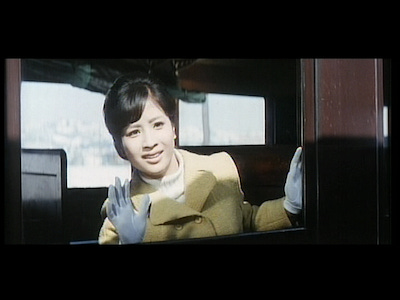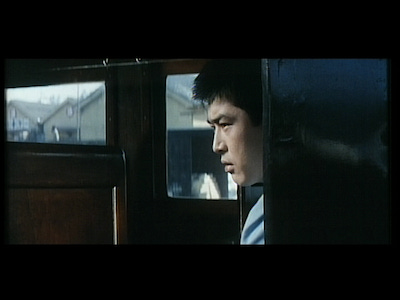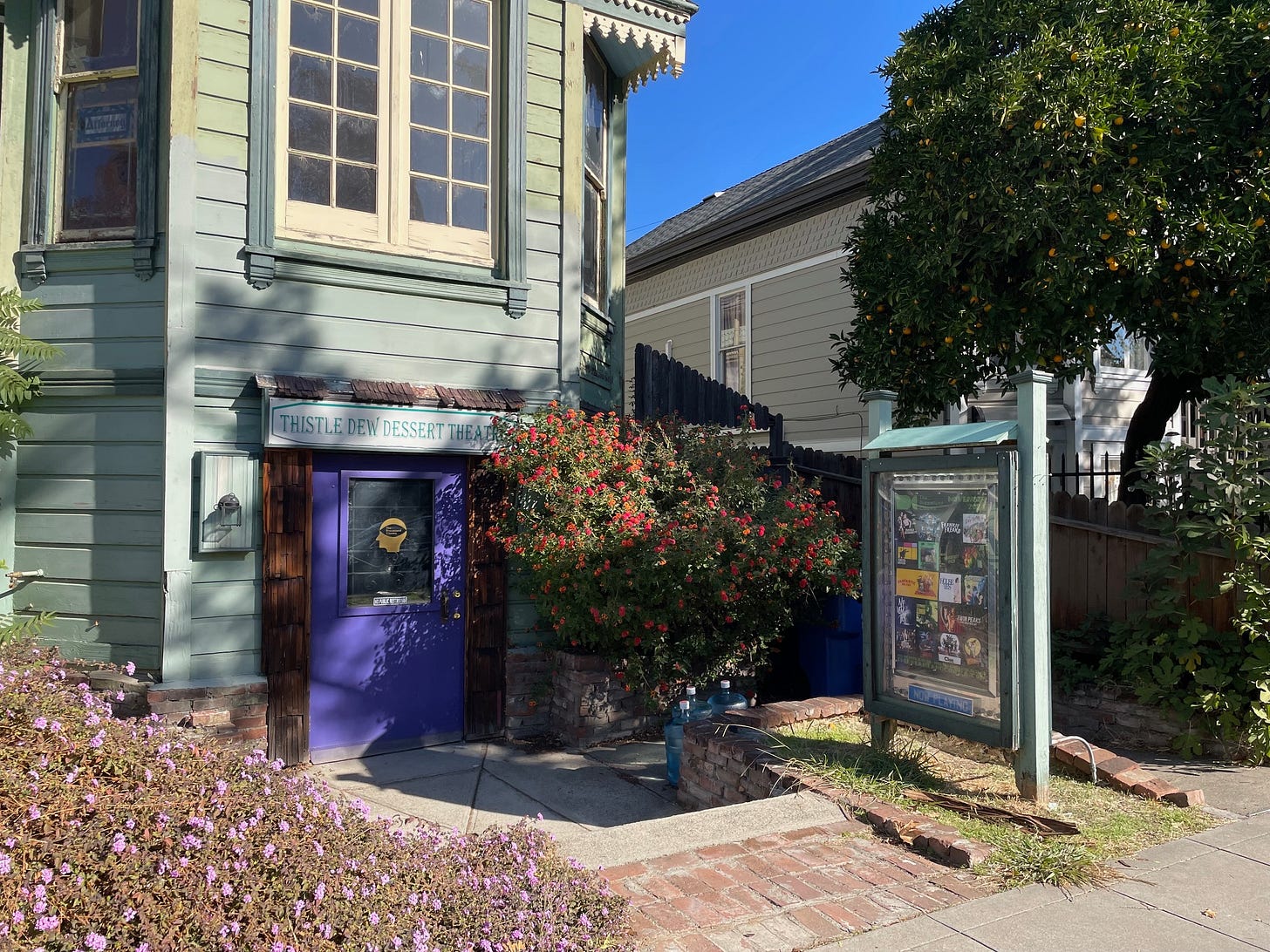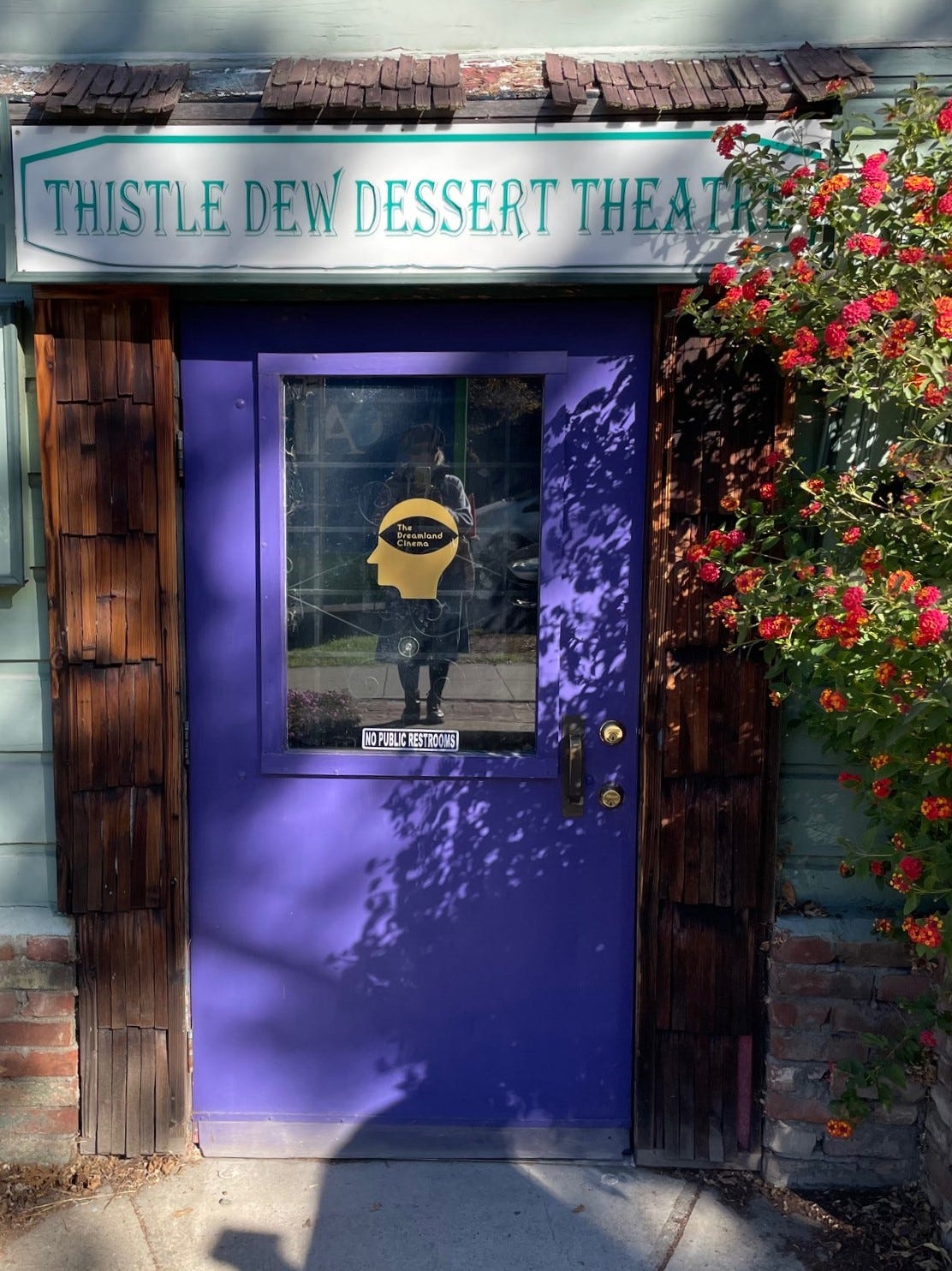One of the cool places I can walk to from my house is the Dreamland Cinema, a micro-theater currently located at 1901 P Street in Midtown Sacramento.
Their specialty is horror movies, which isn’t ordinarily my cup of tea (with some notable exceptions, one of which I mention below). But they also feature not-all-that-horrifying indie and foreign films you don’t usually get to see on a big-ish screen, and they attract friendly film-lovers who are fun to watch movies with. I’ve seen the Gothic 1967 Soviet movie Viy there (weird, worth seeing), as well as the French New Wave “classic” Last Year at Marienbad (moody, boring), and the problematic Lars von Trier’s Melancholia (probably revealing myself too much here, but this film really, really “spoke” to me).
The other night, Dan and I saw Seijun Suzuki’s over-the-top 1966 yakuza flick Tokyo Drifter. It’s available at the Criterion Channel right now, if you have an account there. I do, which means I could’ve watched it in the comfort of my own living room without craning my head around the tall people in front of me to read the subtitles (no, my Japanese isn’t good enough to follow yakuza-speak). But it was worth the mild discomforts to enjoy it with the other 24 film lovers in attendance (the place seats 26, and it was sold out). I loved the cheesily marvelous 1980s Japanese music videos they showed before the movie. I loved knowing that when the film ended, everyone would clap. I loved when the delightfully nerdy guy next to me said, “Well, that was relatable.”
I’ve only seen a few films in this genre. Takeshi Kitano’s Sonatine (brilliant). Kurosawa’s Drunken Angel (Mifune is Mifune here; for me the real draw is always Takashi Shimura). Does the BBC crime series Giri/Haji count? Don’t even mention Black Rain, unless you’re talking about Masuji Ibuse’s novel about Hiroshima. So, not really a yakuza film buff and most certainly no expert.
But for my money (and tickets at Dreamland are currently just $10 + $1.63 online processing fee), Tokyo Drifter was terrific from beginning to end. The washed-out black & white opening giving way suddenly to saturated color, like Wizard of Oz, or like my own childhood memories of Japan. The lurid sets, reminiscent of Kobayashi’s trippy horror movie Kwaidan of just a few years earlier (one of the “notable exceptions” mentioned above). The unapologetic over-use of the theme song (about which more below). The whistling of that melody by protagonist Tetsu (played by the late Tetsuya Watari) to signal his approach, harking back to ominous whistlers of past films like M and heralding future whistling gangsters like the late great Michael Kenneth Williams as Omar in The Wire. The crazy fight sequence that looked more like a samurai battle. Or the one in a Sasebo watering hole that seemed lifted from an outrageous Western (and involved, absurdly yet satisfyingly, lots of white actors clownishly playing US servicemen getting their asses kicked). The final showdown in a surreal nightclub space, where a grand piano and broken wineglass play pivotal roles. This trailer offers glimpses of some of this, plus you get the song:
A lot of what’s written about the film talks about how the plot makes no sense. I don’t know. It doesn’t not make sense. Maybe from my vantage point on the cusp of a pinch-me-this-cannot-possibly-be-happening second Trump term, absurdities and plot holes just don’t seem implausible anymore.
There are also trains. Old steam trains with hard wooden benches. A predictable but still beautifully shot parting between lovers riding on passing trains. A showdown in front of an approaching train. I was a small child still living in Japan when this film came out, and although the famous bullet trains had started running in 1964 in time for the Tokyo Olympics, in 1966, most people in Japan were riding these older trains. I must have ridden on such trains myself, accompanied by my impossibly young parents.


Anyway, 5 out of 5, highly recommend, et cetera. If you’re in Sacramento and haven’t visited the Dreamland Cinema, check them out or follow them on Instagram. They just successfully completed an Indiegogo campaign to secure larger Midtown digs. Go, Dreamland!
As for me, I think Suzuki’s other much-hailed “masterpiece,” Branded to Kill, also available at Criterion, is on my to-watch list. What’s on your movie watch list? Any recommendations, yakuza-inflected or otherwise?
Today’s bit of erudition: One could—and I did—go down any number of rabbit-holes here, but the one I’ll share with you is about the theme song, “Tokyo nagaremono,” sung in the film by its star, Tetsuya Watari.
Some English-language sources I looked at (like this one) suggest the song was written by the film’s music director, Hajime Kaburagi, for the film. But at Criterion I watched part of a 2011 interview with Suzuki in which he says the film was a kayō eiga (歌謡映画), a “pop song movie.” And the Japanese Wikipedia page for Tokyo nagaremono describes its melody as a traditional song of unknown origin, sung to various words through the years, but first popularized in 1965 (the year before Tokyo Drifter came out) by competing pop stars.
So the movie was made in order to feature the song, not the song for the movie. There must be other movies—maybe many other movies—for which this is true, although at noon on the day after seeing Tokyo Drifter, one doesn’t come immediately to mind. Can you think of one?





Comrade!
I was so inclined to comment that I even made a Substack account. One day hopefully I'll start writing stuff down as well.
Some observations:
- The cinema looks so cool. Take me there when I finally get to visit you in Sacramento!
- Suzuki is a wild one. Like the guy a lot, but need to watch much more. Tokyo Drifter is phenomenal.
- I feel like I'm doing a full circle on Von Trier. Liked him a lot in my early days of cinephilia; later on, started thinking of him as an annoying poseur; am now going back to him and feeling that, hmm, he's definitely got *something*. Even the provocateur vibes are coming off as flat-out hilarious nowadays. Still hate Nymphomaniac, though.
- I frowned a bit when I read Marienbad described as "moody, boring", but then I thought a bit about it, and... yes, I think I agree. There's something about Resnais that feels dated (and so French, my God) nowadays. I remember really enjoying Marienbad and Hiroshima back when I first watched them, but not that long ago I watched "My American Uncle" and suffered the whole way through.
- Regarding the song bit: have you seen Nicholas Ray's Johnny Guitar? Not sure what's the story behind the music there, but for musically curious, genre-defying, colorful, over-the-top filmmaking, I think it doesn't get much better than that.
Film written for a song, I love that! Also love the song now and added it to my playlist on Spotify (I know, I should probably not have a Spotify account because it’s bad to the artists, but it’s so convenient for a music love like myself). I’m also adding Tokyo Drifter to my ever-growing must-watch list. I watch a lot of TV/streaming series and films for a living that I sometimes miss out on so much because I stay away from screens on my free time sometimes. Needless to say, my must watch-list is backed up as the moment. I also love the idea of a small cinema experience. Watching a film on the big screen (the way it is intended) is so much better than any high-definition 100-inch flatscreen (do they make those yet) can offer. The audience adds so much to the experience! It has also been a little while since I’ve watched a film on the big screen. Sometimes I get to screen the films I subtitle for work on small screening rooms, but I don’t think that counts. And to circle back on the whole “film written for a song” idea, I find most of my creative inspiration to come from music. Yes, I am typing this as I listen to Spotify play my current “most played” songs in shuffled. :)